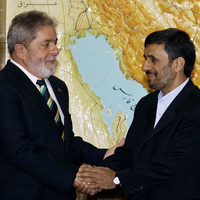It looks like Turkey and Brazil might be making the same mistake that France made in 2003, which still serves as the textbook example of an old friend of mine’s admonition regarding marital disputes: Being right is overrated. Clearly subsequent events vindicated France’s position on the Iraq invasion. But anyone who thinks that France did not pay a price for actively lobbying to shoot down the U.N. resolution authorizing it — including then-Foreign Minister Dominique de Villepin’s ill-advised tour of African capitals — is mistaken. The move demonstrated France’s ability to build consensus among a strategically weightless constituency, but led […]
Iran Archive
Free Newsletter

It is by now the consensus view that the primary strategic beneficiary of the Iraq War has been Iran. By this view, the removal of a hostile regime in Baghdad has not only moved Iraq into the Iranian sphere of influence, but has also opened the floodgates for Tehran to extend its influence westward throughout the Middle East. This analysis, while compelling, begs the question: If Iran has “won” the Iraq War, just what has it really won? In a best-case scenario of a stable Iraq, it still amounts to a potentially volatile and dangerous relationship, and definitely a high-maintenance […]

The “fog of sanctions” has descended on Washington, obscuring what this week’s proposed U.N. Security Council resolution can accomplish in stifling Iran’s drive to nuclear weapons. No less perilous than the “fog of war” that besets generals, the “fog of sanctions” prevents pundits and politicians from having a clear view of the power and potential of this draft document (.pdf), which may be the strongest set of smart sanctions ever developed by the Security Council. The resolution’s first strength is that it undermines real assets and capabilities that Iran might use for weapons production. The document astutely mixes compulsory and […]
According to Le Figaro, the language of the Iran sanctions draft resolution (.pdf) floated last week by the Obama administration would not prohibit delivery of the long-contracted but repeatedly delayed Iranian purchase of Russian S-300 air defense systems. The draft prohibits the sale or transfer to Iran of “missiles or missile systems as defined for the purpose of the United Nations Register on Conventional Arms.” As Le Fig points out, that register explicitly does not include ground-to-air missiles such as the S-300. Pretty clever, as far as stealth concessions to Russia go.
When the Iranian revolution against the Shah Reza Pahlavi reached critical mass in late-1978, the United States found itself with very limited political leverage in Iran because of a longstanding U.S. commitment to ignore the country’s opposition politicians. Washington had considered this precondition an acceptable price to pay for the shah’s support of the West during the Cold War. But it backfired when the shah found himself facing a tidal wave of mullah-led unrest. The Carter administration, fearing the shah’s displeasure, simply waited too long to press him to replace his autocratic rule with a reformist government. In 1979, desperate […]

The curtain rose on yet another act in the Iran drama this week. It began with the “diplomatic breakthrough” achieved by Brazil and Turkey: an Iranian agreement in principle to the fuel swap proposal, by which uranium is sent out of the country, turned into fuel rods, and returned for peaceful, civilian use. The plot thickened with the announcement by U.S. Secretary of State Hillary Clinton that the other permanent members of the U.N. Security Council — and in particular Russia and China — had agreed to bring to the table for discussion a draft resolution imposing a fourth set […]
Secretary Clinton testifies before the Senate Foreign Relations Committee on The New START Treaty. Clinton says that this treaty, as with the ones that came before it, is better than not having any assurances at all. She says that a drawdown in nuclear stockpiles is a sign of the times and that the current heightened level of nuclear arms possessed by both Russia and U.S. dates back to Cold War levels and is largely unnecessary.

Although its future is shrouded in doubt, the deal announced on Monday by the Turkish and Brazilian presidents that would allow Iran to ship half of its enriched uranium across the border to Turkey will very likely also serve as an important milestone in the development of a new Turkish foreign policy that is increasingly independent, assertive and engaged in regional — and even global — affairs. For Turkey, the deal represents a major achievement in its effort to engage Iran and to promote a diplomatic solution to the ongoing debate over Tehran’s nuclear program — while in the process […]
My first reaction on reading the draft resolution of the U.N. sanctions against Iran (.pdf) now being circulated was that the economic component seemed pretty ho-hum, certainly far from the crippling measures we’ve been hearing about for the past few months. On the other hand, the military component caught my eye, because it seemed to put the kabosh on any hope Iran might still have of taking delivery of the Russian-made S-300 air defense missile systems it had contracted for. Today the AFP is reporting that if the draft stands as written, that is in fact the case. That represents […]
Russian and China have reached a deal with the U.S. and other world powers to impose new sanctions on Iran, a day after the country signed a deal with Turkey and Brazil to swap its nuclear fuel. NewsHour’s Jeffrey Brown reports on the developments. Having trouble viewing this video? Click here to watch.
Following up on my previous post, I thought I’d flag another perspective, and one that I find compelling, from Gary Sick. I think Sick is a bit quick to overlook the significance of Iran’s refusal (so far) to suspend 20 percent uranium enrichment. So I’m not sure it was yet appropriate to take yes for answer. But I agree that the timing of the U.N. sanctions announcement on the part of the Obama administration was pretty lousy. Even if the adminsitration had held on to the option of proceeding with a draft sanctions resolution, it should have at least given […]
Just a few quick thoughts on the Iran fuel swap deal brokered by Trukey and Brazil. First, it shows that the threat of U.N. sanctions was tactically effective, even if the actual sanctions themselves prove to be strategically ineffective. The threatened fourth round, and the diplomatic isolation among the permanent UNSC members that it implied, was probably a motivating factor in getting Iran to sign on, and definitely the motivating factor in generating Turkish and Brazilian involvement. Second, it’s premature to say that the deal is proof of Turkey reaching the “big leagues” in terms of its diplomatic stature. Sometimes […]

Yesterday’s joint declaration by Brazil, Turkey and Iran does not end the Iranian nuclear crisis. With luck, it may mark the beginning of the end, though it will need to overcome some major hurdles even to achieve that goal. In their trilateral statement, the three governments propose that Iran “deposit” 1,200 kilograms of its low-enriched uranium in Turkey pending receipt within one year of 120 kilograms of more-highly enriched uranium suitable for Tehran’s Research Reactor (TRR). Since early last year, the Iranian government has been seeking to acquire specially enriched uranium fuel for the TRR. The reactor, built by the […]

The Obama administration is moving ahead with a James Baker-style strategy in attempting to persuade Russia to support stronger and stricter sanctions against Iran. This week, the president submitted the “123 Agreement” on civilian nuclear cooperation to Congress. The agreement had been initialed during the Bush administration, but was withdrawn from congressional consideration after the Russia-Georgia war in 2008. It will now take effect unless both houses of Congress pass legislation to block its implementation within a 90-day period. The agreement matters a great deal to the Russian nuclear industry, which, along with the country’s oil and gas complexes, makes […]

Last week, Brazil’s President Luiz Inácio Lula da Silva was informally tapped to mediate negotiations between Iran and the West over the Islamic Republic’s nuclear program, after Iranian President Mahmoud Ahmadinejad reportedly told his “brother,” Venezuelan President Hugo Chávez, that Iran was prepared to accept Brazilian mediation “in principle.” The starting point for talks will be the same as last fall’s nuclear fuel swap deal, whereby Iran was to ship its enriched uranium to France and Russia for reprocessing, after which the reprocessed fuel would be returned to Iran for use in the Tehran medical reactor. But while Lula is […]

Iran’s alleged clandestine pursuit of a nuclear-weapon capability dominated the headlines last week during the ongoing Nuclear Nonproliferation Treaty (NPT) Review Conference. However, beyond the theatrics of President Mahmoud Ahmadinejad and U.S. Secretary of State Hillary Clinton’s verbal exchange, it is important to remember, and ultimately to address, the root cause of the Iranian nuclear problem — namely, the spread of dual-use technologies such as uranium enrichment to countries outside the ring of first-order world powers. The problem with uranium enrichment is its ambiguity: It is a vital component of the civilian nuclear power industry, yet it can also be […]
